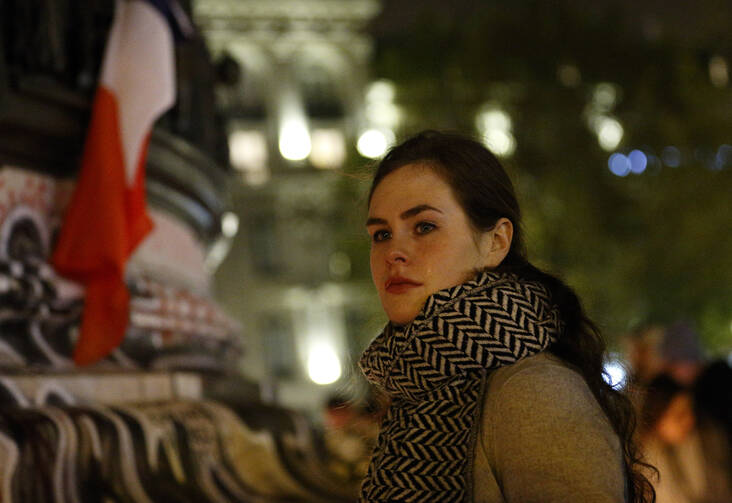In the aftermath of the attacks in Paris, which at press time had claimed 132 lives and left hundreds more wounded, President François Hollande vowed to “be unforgiving with the barbarians from Daesh.” By Nov. 15 France had begun bombing raids on the ersatz capital of ISIS, Raqqa in Syria.
Cardinal Timothy Dolan, Archbishop of New York, called the Paris attacks “unspeakable and horrific crimes.” He said, “I join with our Holy Father and with the United States Conference of Catholic Bishops in condemning these brutal acts of terrorism, and praying for those who were killed and injured, along with their families and loved ones.
“I have been in contact with Andre Cardinal Vingt-Trois, the Archbishop of Paris, to express the sympathy and solidarity of all New Yorkers at this terrible time. Sadly, New Yorkers are all too familiar with the pain and sorrow that accompanies these kinds of terrorist acts, but I echo the Cardinal’s call that ‘no one indulge in panic or hatred’ but continue to respond with ‘moderation, temperance and control,’ just as New Yorkers did in the aftermath of 9/11.”
As news of small reprisal gestures against Syrian refugees in Europe began to surface and the Internet became cloudy with ugly calls for retaliation against Muslims and celebrations of the mayhem in Paris among Daesh sympathizers, Thomas Rosica, C.S.B., the English language attaché, Holy See Press Office, warned against the events in Paris being used to interrupt Muslim-Christian dialogue: "The tragic, violent events of the past days in Beirut and Paris, as well as the recent downing of a Russian plane fill us all with rage, horror and fear and cause many of us to ask: 'Is there still space for dialogue with Muslims?'
"The answer is: yes, now more than ever," he said in a statement released on Nov. 15.
“I am profoundly convinced that we must not yield to the negative pressures in our midst, but must affirm the values of mutual respect, solidarity and peace,” Father Rosica said. “The life of every human being is sacred, both for Christians and for Muslims. There is plenty of scope for us to act together in the service of fundamental moral values. The lessons of the past must help us to avoid repeating the same mistakes. We must seek paths of reconciliation and learn to live with respect for each other's identity.
“What we are witnessing today,” Father Rosica wrote, “are extremists who try to monopolize the religious leadership, whether it is Christians, Jews or Muslims. To kill in the name of religion is not only an offense to God, but it is also a defeat for humanity. No situation can justify such criminal activity, which covers the perpetrators with infamy, and it is all the more deplorable when it hides behind religion, thereby bringing the pure truth of God down to the level of the terrorists’ own blindness and moral perversion.”
After meeting with Pope Francis on Nov. 14 in Rome at an event commemorating the 35th anniversary of the Jesuit Refugee Services, its international director, Thomas Smolich, S.J., joined his prayers with the pope for the victims and survivors of the Nov. 13 attacks. He added, “We would want to make sure that what happened last night is not globalized to say, ‘This is all of Islam; this is all the Muslim faith.’ These are people within a group of people who are doing evil things for reasons that don’t make a lot of sense to us.
Father Smolich said, “I think it’s very important to realize that people who are coming to Europe right now—Syrians and others who are coming through—are fleeing the same situations. They have left barrel bombs in Aleppo; they have left random attacks in Damascus, in Iraq, in other parts of the world.
“They are coming to escape what has unfortunately come to Europe, so to blame them, which I think is perhaps a knee jerk reaction to this, is not the right thing to do. It’s to realize that the folks who are coming want the same freedom and the same freedom of living that we hope to enjoy here in Europe.” JRS, and particularly JRS France, he said has worked on welcoming and integrating new arrivals to Europe, a process even more important now in the light of the suffering in Paris and potential reactions to it “so we can truly build one human family.”








